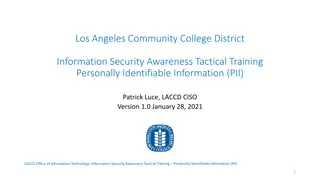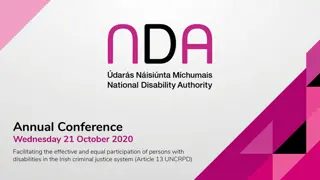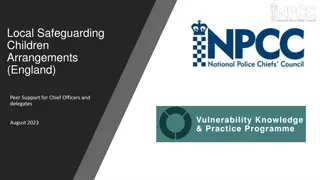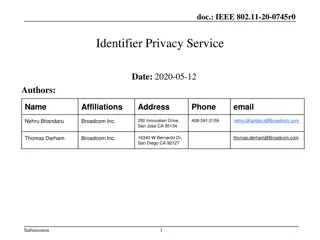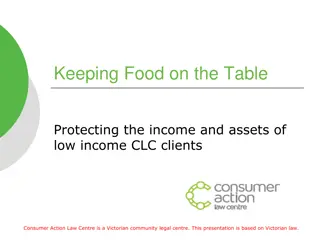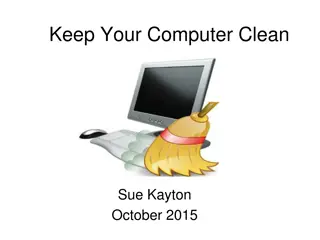
Protecting your Home
PROTECTING YOUR HOME PROTECTING YOUR HOME It is well known nowadays that if you or your partner end your days in a care home the local authority will seize your assets to cover your care fees. Plans are in England now to cap the amount they
Download Presentation

Please find below an Image/Link to download the presentation.
The content on the website is provided AS IS for your information and personal use only. It may not be sold, licensed, or shared on other websites without obtaining consent from the author. Download presentation by click this link. If you encounter any issues during the download, it is possible that the publisher has removed the file from their server.
E N D
Presentation Transcript
Protecting Your Home PROTECTING YOUR HOME It is well known nowadays that if you or your partner end your days in a care home the local authority will seize your assets to cover your care fees. Plans are in England now to cap the amount they will take from an individual at 86,000 BUT THERE IS NO CAP IN SCOTLAND. Currently, the annual cost of someone in care is in excess of 50,000. This means that no matter how hard you have worked all your life to pay for your home and no matter how much you may have paid in Nation Insurance contributions over the course of your working life, the local authority will take your home if you go into care. Exceptions: 1.You have a pension that will cover the cost of your care therefore as long as this continues to cover the rising costs of care (currently upwards of 50,000 per year) your home will not be touched. 2.You have enough savings to cover the 50,000 plus per year and you have not taken steps to protect your savings from attack.
WHAT CAN I DO? There are legitimate ways to protect your home from attack with proper planning. However, there is no one size fits all solution. We are aware that some firms will only provide a single solution to this problem meaning that regardless of it being the best advice, it will be the only solution offered, but we are able to offer you a choice depending upon your individual circumstances as we provide multiple solutions. ARRANGE A FREE NO-OBLIGATION APPOINTMENT TO SEE WHAT YOU CAN DO. One of the favourite products with our clients is Protected Property Trust. Who Can Benefit from a PPT? What Is a Protected Property Trust (PPT)? What Is a Trust? Example of how a PPT works Mr and Mrs. A set up a trust over their property, which is held in joint names. If Mrs. A dies before her husband, her share of the property goes into the protection trust. Her husband gets the rest of the estate. Mr. A has the right to live in the property, and if he needs long term care, then Mrs. A s share of the property is already in the property protection trust
. Therefore it cannot be assessed as capital to pay Mr. A s care fees because it doesn t belong to him. After Mr. A s death, the trust ends, and Mrs. A s share of the estate passes to the beneficiaries, without them having to pay capital gains tax. What Happens If the Survivor Has to Move into Residential Care? Who Are the Trustees? What Does the PPT Mean for the Surviving Spouse? How Much Does a PPT? How Do I Go About Putting Property in Trust and into My Will? WHICHMONEY What is a will trust? A will trust also known as a testamentary trust is created within your will to allow you to protect property you hope to pass on to your family. Trusts are legal entities that allow someone to benefit from an asset without being the legal owner. You create the trust and appoint a person to manage it the trustee . The trustee manages the trust on behalf of the beneficiaries those who receive the income of the trust. Establishing trusts can give you an element of control over assets you wouldn t have if you gave them away outright.. There are two main types of trust that you might choose to set up: a will trust, created upon your death, or a lifetime trust, which you establish during your lifetime. We explain the pros and cons of both.
Leaving property in a will trust Unlike a lifetime trust, a will trust is only created once you pass away. You set up the conditions of the trust in your will and it activates upon your death. Will trusts are mainly used by couples to split ownership of the family home if they own it as tenants in common . Rather than leaving their share to each other, they each leave it to a trust, which comes into being on the death of the first partner. Until recently, will trusts were a common way of saving on inheritance tax (IHT). A couple potentially liable for IHT could split their estate into halves, both below the nil-rate band. However, since 2007 married couples and civil partners have been able to transfer unused IHT allowance to one another. As such, most couples no longer need to make this type of trust for inheritance tax purposes, though it may be used to ring-fence the deceased spouse s share from care home assessments. Find out more: inheritance tax on property Will trusts and long-term care If you use a will trust and your partner dies, you as the surviving spouse retain a right to live in the house. The part- owned by the trust is not counted. In this way, it s protected from care home costs. Government rules (Charging for Residential Accommodation Guide) suggest that this arrangement will not be contested as deliberate deprivation , meaning that you have deliberately split your assets to avoid paying high care-home fees. Find out more: how to avoid inheritance tax this guide explores a range of ways you can reduce the amount of tax due on the transfer of your estate. Will trusts and inheritance Another reason for setting up a will trust is to avoid sideways disinheritance . This occurs when the first partner dies, leaving children from the marriage who might reasonably expect to inherit some of the family estate in due course. If the surviving partner remarries and fails to make provision for their children in a new will, there s a risk that everything will go to their new spouse instead. To avoid this situation, you could set up a life interest trust in your Will, which leaves your share of the family home to your children, while allowing your spouse to carry on enjoying the right to live the property. You should seek legal advice before pursuing this option. Read more: https://www.which.co.uk/money/wills-and-probate/passing- on-your-money/will-trusts-and-lifetime-trusts-aqmf66w4nu5w Which? Read more : https://www.ilawsscotland.co.uk/ppt/

